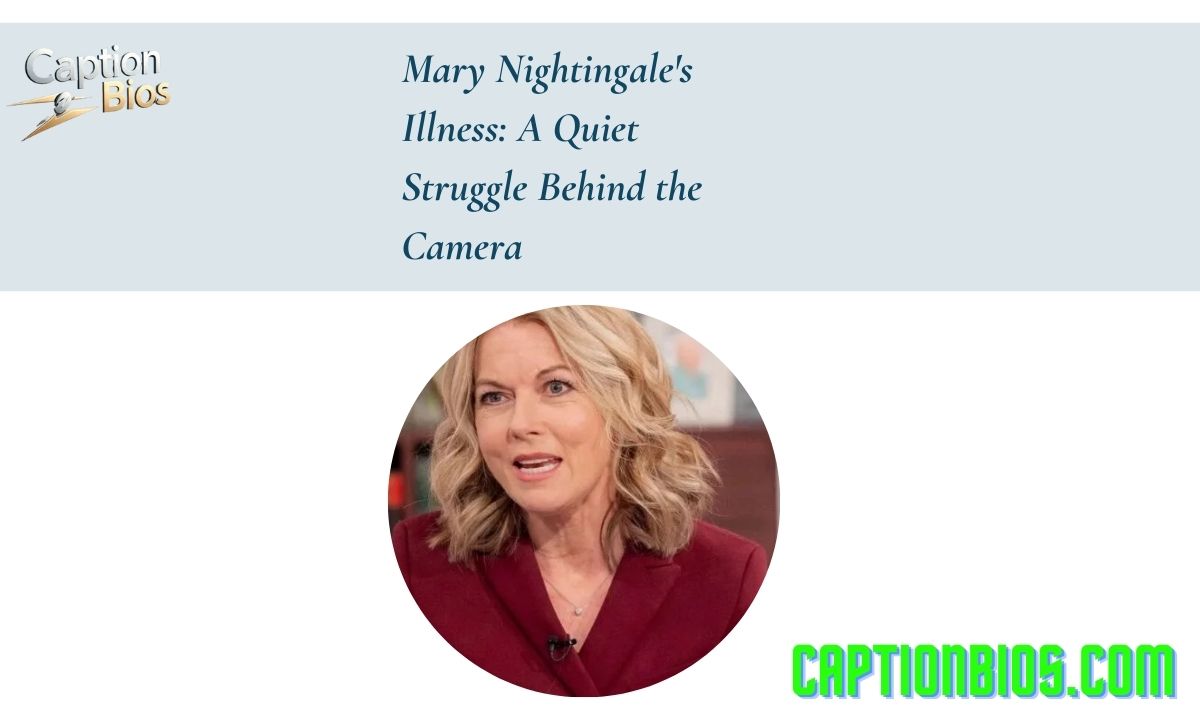Mary Nightingale was born on May 26, 1963, making her 62 years old today. She is a famous British TV news presenter who works for ITV News. Mary has been reading news on television for over 30 years.
During her long career, she faced a serious voice problem that threatened her job. Her illness was vocal strain caused by stress and overwork from years of broadcasting. Mary quietly fought this health battle and recovered with proper treatment and rest.
Real Name
Mary Nightingale’s real name is Mary Louise Nightingale. It is a beautiful and meaningful name that suits the personality very well. People find it easy to say and remember, and it leaves a good impression on everyone.Is known for being kind, polite, and friendly toward others. The name also reflects a positive and respectful character that people admire.
The good news came after all the tests. Mary did not have cancer. Her vocal cords were not damaged forever. The doctors found something else that could be fixed.The doctors said her problem was vocal strain. This happens when people use their voice too much. It also happens from stress and not resting enough. Many professional speakers get this problem.
Bio/Wiki
| Category | Details |
|---|---|
| Full name | Mary Louise Nightingale |
| Date of birth | 26 May 1963 |
| Age | 62 (as of 2025) |
| Birthplace | Scarborough, North Yorkshire, England |
| Nationality | British / English |
| Education | BA in English, Bedford College, University of London |
| Occupation | Journalist, TV News Presenter |
| Employer | ITV News |
| Major Role | Presenter of ITV Evening News (since 2001) |
| Years active | 1990–present |
| Spouse | Paul Fenwick (married April 2000) |
| Children | Two (Molly and Joe) |
| Health issue | Vocal strain (stress-related) |
| Diagnosis | Stress-induced vocal strain; throat cancer ruled out after tests |
| Recovery / Treatment | Voice therapy, breathing exercises, better posture, vocal rest, hydration |
| Notable awards | TRIC Awards – “Newscaster of the Year” (2002, 2004) |
| Residence | Hammersmith, West London |
Age,Weight and Height
Mary Nightingale was born on May 26, 1963 and 62 years old in 2025, approximately Height 5 feet 9 inches tall, and with a weight of approximately 65 kg. These indications indicate a fit and healthy body. Playing, exercises and good food keep one strong and fit. It is also easy to participate in games and sports because of a good height and weight.
Mary first noticed her voice acting strange during practice. Sometimes it would crack when she spoke. Other times it felt weak and tired. She could not speak as clearly as before. At first, Mary thought it was just a cold. Maybe her throat was dry from the weather. But the problem did not go away. It kept getting worse day by day.
Next Steps and Goals
The voice problems happened more often. Mary started to worry. For someone whose job depends on speaking, even small voice changes are scary. She tried to hide it but felt worried inside.Mary did not know what was wrong with her voice. This made her very scared.
She worried it could be something serious like throat cancer. Many people get this disease and it can end a speaking career.She kept working but felt anxious all the time. The fear was always in her mind. She did not tell anyone about her worries. She wanted to stay professional and strong.
Early Life and Education
Mary Nightingale’s illness brought her silent fear. Being famous made it harder to ask for help. People expect TV stars to be perfect. Admitting problems felt impossible when everyone was watching her.Mary Nightingale’s illness showed how work stress becomes physical pain.
Her body was telling her to slow down. The voice problems were a warning sign that she needed rest and care.Mary finally went to see doctors about her voice. They did many tests on her throat. They used special cameras to look at her vocal cords. She was scared about what they might find.
Mary Nightingale’s Husband/boyfriend
Popularity and its Reason
Mary’s story teaches important lessons about health and work. Many people in demanding jobs face similar problems. Stress and overwork can cause real physical damage that needs medical attention.Her experience shows that vocal strain is preventable. Professional speakers need to take care of their voices. Regular rest and proper technique can prevent serious problems from developing.
The doctors told her to rest her voice between shows. had to drink more water every day. She also stopped whispering because it hurts the vocal cords more than normal speaking.Mary changed her lifestyle to help her voice heal. She slept more hours each night.
Mary Nightingale’s Career
Mary started her TV career many years ago. She quickly became a main news reader. Her job was to tell people important news every day. This work has a lot of pressure and stress. TV news presenters work very hard. They read scripts for hours.
They must look calm even when the news is bad. This puts stress on their body and mind. Mary Nightingale’s illness started because of this pressure. Speaking for long hours every day hurt her voice. The stress of live TV made things worse. Many news readers face similar problems but keep quiet about them.
Mary Nightingale’s Networth
Mary Nightingale’s has made something of himself, achieving many good things through hard work and dedication. The net worth of $ 1 milion reflects the result of this effort and determination. There is a lot of talent and success shown by the achievements and awards.
Mary learned that stress can hurt the body in real ways. It is not just mental. High-pressure jobs can cause physical problems too. Her voice problems came from too much work stress.News readers face stress every day. They speak for hours under bright lights. They must stay calm during breaking news. This constant pressure hurts the vocal cords over time.
Nationality and Religion
Mary Nightingale’s is Nationality English and belongs to the Jewish religion. This demonstrates that they love their country and respect their beliefs. The nationality and religion assist in experiencing the good values such as kindness, truthfulness and respect towards others.
Mary got help from her work colleagues at ITV. Her bosses understood she needed changes to get better. They made her work schedule easier. They gave her more breaks between news shows.This support was very important for her recovery. Some workers are scared to tell bosses about health problems. They worry about losing their jobs. Mary was lucky to have understanding managers.
Read More
Mary’s voice slowly got better with treatment and rest. The therapy worked well. Her voice became strong and reliable again. She could speak clearly like before her illness started. The recovery took time and patience. Mary had to be careful not to push too hard. She learned to listen to her body’s warning signs. Rest became as important as work in her daily routine.
Mary returned to full strength without making big announcements. She let her good work speak for itself. Viewers saw her professional performance but not the hard work behind her recovery.Mary Nightingale’s illness also shows the importance of workplace support. Employers need to understand when workers have health problems. Flexibility and understanding help people recover and return stronger.
Interesting Facts
The TV industry learned from Mary’s experience. News stations now think more about protecting their presenters’ health. They try to prevent burnout and voice strain before it happens.Reporting during COVID-19 was “relentlessly grim” as Mary described it. Every day brought bad news about the virus. This mental burden made her voice recovery even harder to achieve.
Mary Nightingale’s illness happened during the COVID-19 pandemic. This was a very hard time for news readers. They had to report sad news every day. Death numbers and lockdown rules made the job very stressful.The pandemic made Mary’s voice problems worse. She had to work longer hours reporting coronavirus news. The emotional weight of the stories added to her physical strain.
Conclusion
Mary Nightingale’s illness shows that even strong public figures face private health battles. Her voice problems came from years of high-pressure work and stress. But with proper treatment, support, and lifestyle changes, she recovered completely.
Her quiet strength during this difficult time teaches us important lessons. Taking care of our health is not weakness – it is wisdom. Getting help early and making necessary changes can prevent small problems from becoming big ones.
FAQS
What caused Mary Nightingale’s illness?
Her illness was vocal strain from overuse, stress, and working too many hours without enough rest.
Did Mary Nightingale have throat cancer?
No, doctors ruled out cancer. Her problem was vocal strain that could be treated and fixed.
How did Mary treat her voice problems?
She used voice therapy, breathing exercises, more rest, better hydration, and lifestyle changes.
Did ITV support Mary during her illness?
Yes, ITV management helped by adjusting her schedule and giving her more breaks between shows.
When did Mary’s voice problems happen?
The problems started during her long career but got worse during the COVID-19 pandemic reporting period.
Muhammad Shoaib is a creative writer with over 5 years of experience crafting impactful captions, memorable quotes, and clever pick-up lines that spark engagement and emotion. As the lead content expert at CaptionBios.com, Shoaib helps people express themselves with style, humor, and authenticity across social media and messaging platforms.






Leave a Reply